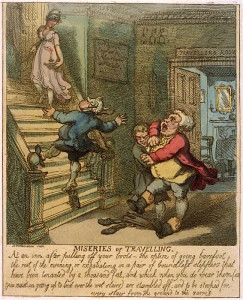 Miseries of Twenty First Century Life (inspired by James Beresford’s 1806 masterpiece).
Miseries of Twenty First Century Life (inspired by James Beresford’s 1806 masterpiece).
Miseries of Travelling.
Arriving at Middlesborough station and finding your way somehow to your B & B in some godawful back street, you are show to your room but after unpacking your suitcase, find that a mini-monsoon has prevented you from leaving your room in search of a pub, and with the town centre over a mile away. The TV doesn’t seem to be working, you can’t get a signal on your mobile , so for entertainment you first inspect the walls for perhaps an old steel engraving of a local beauty spot or two and find instead a reproduction of a rural scene by Helen Allingham and a daub of a cat by a girl aged 8; you then turn in desperation to a couple of shelves opposite the bed and find a Goss china souvenir of Harrogate, a lamp made out of a Chianti bottle, a pottery frog and a leaping dolphin hand crafted from grey resin. You look among some likely looking books and find nothing but three scruffy paperbacks of James Herbert, a mint copy of The Maid of Buttermere by Melvyn Bragg, a slimmer’s cookbook with an introduction by Gloria Hunniford, four Joanna Trollopes, two chicklit novels by women called Charlotte Gibbons and Vicki Manderson, an Argos catalogue of 2003, a battered poetry anthology by C Day Lewis, an odd volume of the works of Walter Scott, undated but c 1880, the autobiography of Alan Shearer, a paperback of popular astrology by Dale Winton, a local bus timetable dated 1985, a 1970s guide to Athens and an old copy of This England with several pages missing… [R.M.Healey]



